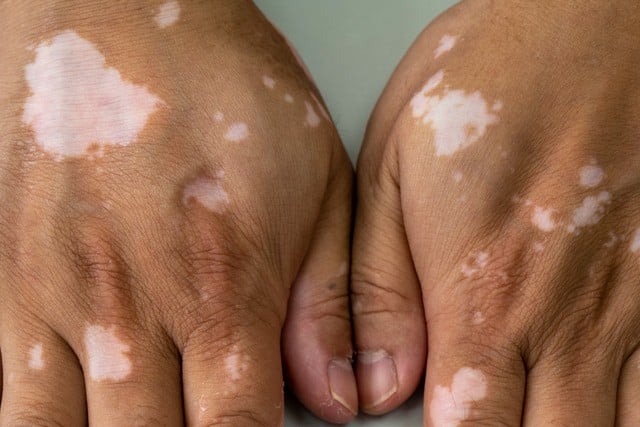Does vitiligo go away on its own?

Conditions such as vitiligo are often diagnosed in patients who are experiencing discoloration of the skin. While it is completely harmless, it can have a significant impact on one’s quality of life and self-confidence, especially if it develops on very visible areas of the face and body. With a proper diagnosis at the Dermatology Treatment and Research Center, patients will be able to learn more about the condition and how to manage it.
What is vitiligo?
Vitiligo is a condition that destroys the natural pigment cells in the skin called melanin. The absence of melanin can cause white patients on the skin. This condition can develop on anyone at any time.
What causes vitiligo?
Studies continue to look for signs of what causes vitiligo to develop in some patients and not in others. There are certain risk factors that can increase one’s chance of developing vitiligo such as those with a family history of connective tissue diseases or endocrine diseases. Stress, sun exposure, and other environmental factors may also contribute to the formation of vitiligo.
Will vitiligo go away on its own?
In most cases, patients with vitiligo will experience it as a lifelong condition. Learning how to rise above this cosmetic imperfection and maintain confidence is a part of living with vitiligo. While there is no cure for vitiligo, there is hope for treatment. There is continued research and clinical trials for possible medications and solutions for treating vitiligo, and at some point, there may be viable treatment options. In the meantime, there are ways that patients might be able to slow the spread or progression of vitiligo.
Some of the options being explored by professionals today include:
- Eating a healthy diet and maintaining hydration by drinking plenty of water each day
- Using skin treatments to restore pigmentation
- Limiting sun exposure
- Considering the use of cosmetic products to disguise vitiligo
- Reducing consumption of foods with hydroquinone such as berries, wheat products, and alcohol
- Reducing overall stress
Are you interested in learning more about your condition?
If you live in the Dallas, TX area and have been diagnosed with vitiligo, the team at the Dermatology Treatment and Research Center can help you better understand how to live peacefully with this often chronic lifelong condition. The office is located at 5310 Harvest Hill Road, Suite #160 and can be reached by calling (972) 661-2729.